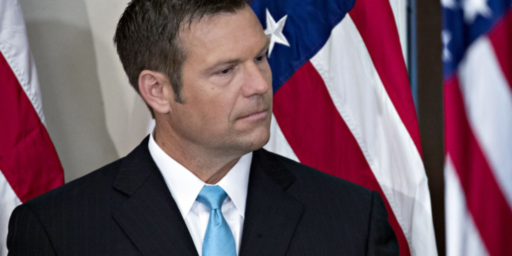Roberts Vote and the 2008 Presidential Race
Jennifer Loven takes a look at the calculations faced by Senators with presidential ambitions–which is to say, Senators–posed by the confirmation process for Supreme Court nominee John Roberts.
Roberts Vote Fraught With 2008 Politics (AP)
Among the senators deciding whether to put John Roberts on the Supreme Court, no one may have more at stake than those with designs on the White House in 2008. For those harboring the slightest interest in a presidential bid, the debate over the first high-court nominee in more than a decade leaves a tricky calculation: what to say — and not to say — about a jurist expected to steer the court to the right but whose enigmatic record makes him difficult to predict. “It matters a lot for the party activists. It matters some for primary voters. And it matters a little for undecided general election voters,” said Jack Pitney, government professor at Claremont McKenna College. “Even if it matters for 5 percent of the electorate — no candidate can ignore that.”
[…]
The decision of how tough a line to take in that process is most difficult for the least-known senators, said Norm Ornstein, a political analyst at the American Enterprise Institute think tank.
Sens. Joe Biden, D-Del., and Sam Brownback, R-Kan. — two talked about as 2008 candidates — are on the Senate Judiciary Committee, which has initial responsibility for considering Roberts. Both men may feel the need to steal some of the national political attention being lavished on Sen. Hillary Rodham Clinton, D-N.Y., and Sen. John McCain, R-Ariz., considered the early 2008 front-runners in the absence of any official word.
For Biden, who has carved a niche as a foreign-policy expert and has been the most open about his White House ambitions, the challenge is to remain statesmanlike while delving aggressively into Roberts’ record, Ornstein said. Biden said Sunday he did not think presidential politics would play a role in how Democrats approach Roberts’ nomination. “Whether or not that is the motivation of anyone voting on Roberts or asking questions about Roberts, I’m sure it’ll be phrased in that context,” he told CBS’ “Face the Nation.”
[….]
Sen. John Kerry, D-Mass., the party’s presidential candidate in 2004, may hope to win the nomination again. On Friday, he urged the White House to release all documents and memos from Roberts’ tenure at the Justice Department during the Reagan administration.
Brownback counts his greatest support among religious conservatives. There could be pressure from GOP activists to make certain Roberts isn’t another David Souter, the Supreme Court justice named by former President Bush who has often sided with liberal members of the court.
Republican Sen. Rick Santorum of Pennsylvania, also a favorite of the right, could face the same problem. In the end, said Pitney, supporting Roberts will likely be an easy call for Brownback and Santorum, along with other Senate Republicans considered presidential material — such as Majority Leader Bill Frist of Tennessee and Chuck Hagel of Nebraska. “I don’t think they’ll press him very hard because they don’t want to blow the nomination,” Pitney said.
Personal political ambitions are presumably not what the Framers had in mind when they vested the Senate with the advise and consent power. Theoretically, Senators are merely supposed to ensure that the nominee is qualified, intellectually and morally, for the position. Given the nature of the Senate, it’s not unreasonable for Senators to look at how the appointment might impact the interests of their States. How it might affect presidential ambitions, however, seems rather clearly outside the purview of the process.





We could amend the Constitution disqualifying any sitting Senator from seeking the presidency, and it wouldn’t narrow the field of electable would-be presidents one whit.